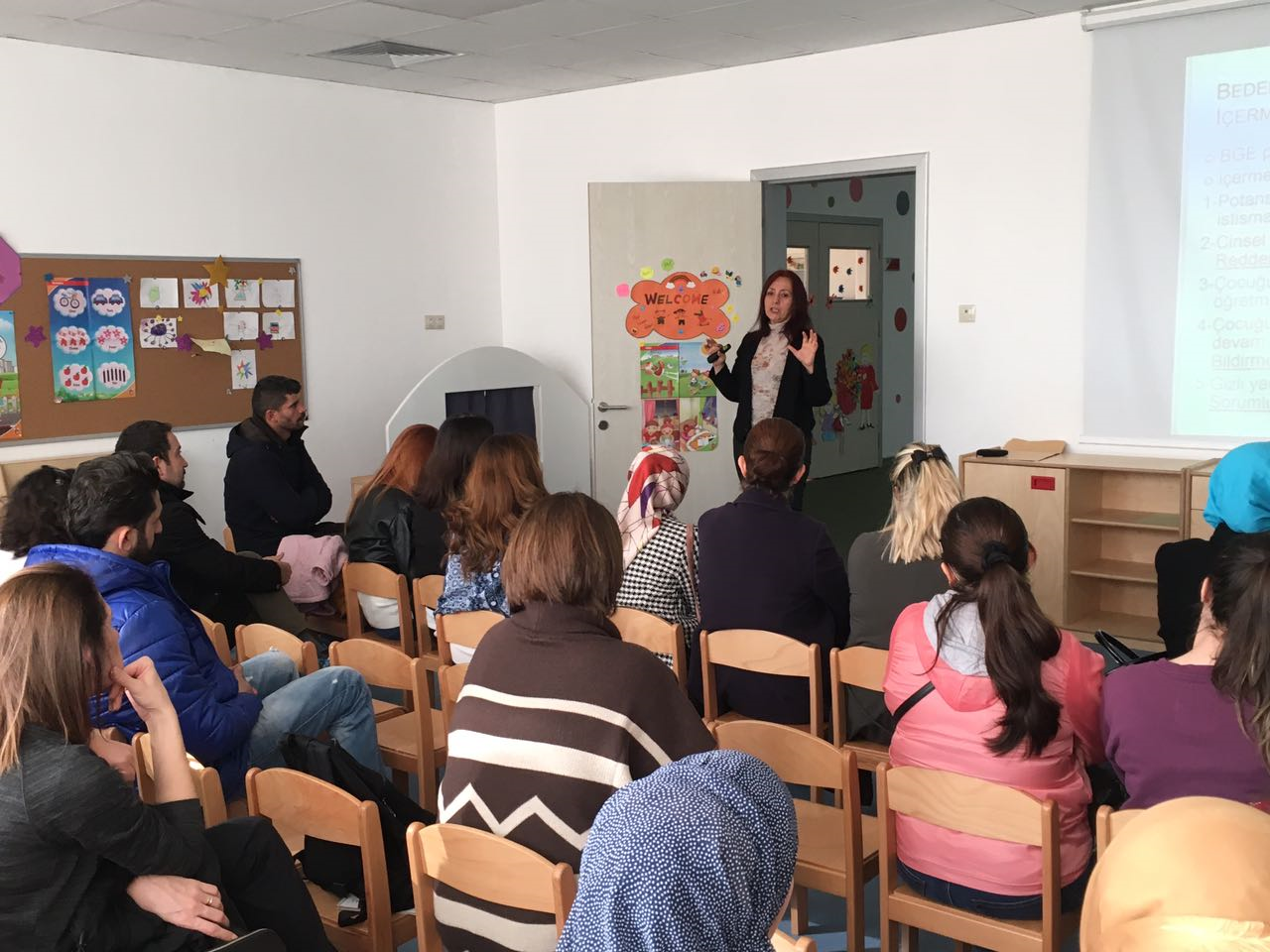Beden Güvenliği Bilgilendirme Çalışması
DOSAB Kreş ve Gündüz Bakımevinde okul öncesi dönem çocuklarının ebeveynlerine yönelik olarak okul öncesi dönemde edinilen cinsiyet rolleri ve okul öncesi dönemde beden güvenliği eğitiminin önemi ve aktarım şekli konularında bilgilendirme çalışması yapılacaktır.
''Okul Öncesi Çocuklar İçin Beden Güvenliği Eğitim Programı''

Ebeveyn Eğitimi
''Okul Öncesi Çocuklar İçin Beden Güvenliği Eğitim Programı''

PDR Öğretmen Eğitimi
.jpg)
3rd European Conference on Child Abuse and Neglect
Date: 25 – 27 May 2016
De Meervaart, Amsterdam, the Netherlands
Preventing Child Sexual Abuse: Body Safety Training Programme for Preschoolers in Turkey
Citak Tunc Gulseren MSc
Background Body safety training within child-centred, behavioural skills education is fundamental for the prevention of sexual abuse.
Methods The “Body Safety Training Programme” is an education programme developed by Wurtele (2007) targeting preschool-aged children, with the aim of ensuring children are informed about their body and attain protection skills. A total of 83 preschoolers were included in the experimental and control group sample design. The children to be included in the sample were identified by means of a power analysis and 40 children comprised the experimental group, while 43 children comprised the control group. The “Body Safety Training Programme” was translated into Turkish; following the reliability for content validity was conducted regarding the language and cultural appropriateness, the training program was implemented with the children in the experimental group in seven sessions, in conjunction with the visual “I am the Boss of my Body” book. The “What If Situation Test” (WIST) was administered to both groups before and after the training. The WIST is a test developed by Wurtele, Hughes and Owens (1998) which measures the self-protection skills of preschoolers.
Results The differences between the pre-test and post-test scores for the sub-dimensions (appropriate touching, inappropriate touching, say, do, tell and reporting skills) and the Personal Safety Scale (PSS) score means for the children in the experimental group were found to be statistically highly significant (p<0.001). The WIST difference mean scores for the sub-dimensions (say, do, tell, report) and the PSS sub-dimension scores between the experimental and control groups were found to be statistically significant (p<0.05). However, there was no significant difference found (p>0.05) between the difference mean scores for the sub-dimension of appropriate touching and inappropriate touching.
Conclusions The Body Safety Training programme is effective in increasing the child sexual abuse prevention and self-protection skills in Turkish preschoolers.
Determining the Appropriateness of the WIST III with Turkish Preschoolers
Citak Tunc Gulseren MSc
BackgroundThe recognition of sexual abuse and display of protective behaviour by preschoolers is foundational in prevention of sexual abuse. Testing tools appropriate to the developmental stage of children must be used in the assessment of children’s skills for recognising sexual abuse and protection from sexual abuse.
Methods
The purpose of the study was to determine the reliability and validity of the WIST III (What If Situation Test) for Turkish culture, which was originally developed by S.K. Wurtele and colleagues (1998). Participants were children of the 3-6 age group attending pre-school education institutions and the sample size was identified by means of a power analysis. 70 children were identified as the sample with 0.85 power and 0.05 type I error according to the power analysis. Language validity, content validity, internal validity coefficient (Cronbach alpha coefficient) and test-retest analyses were conducted in terms of validity and reliability in the scope of efforts for adaptation to Turkish culture.
Results Firstly, the Kendall W=0.83 was found regarding the expert opinions concerning the content validity of the language validity scale. It was found that the Cronbach alpha coefficients were between 0.68 and 0.90 for the scale sub-dimensions of appropriate and inappropriate touching, saying, doing, telling and reporting. The test-retest reliability of the scale was found to be r=0.89 and the test-retest reliabilities for the sub-dimensions (appropriate touching, inappropriate touching, say skills, do skills, tell skills and reporting skills) were between r=0.48 and r=0.92. The test-retest reliability for the Personal Safety Scale (PSS), as having complimentary items to the WIST III, was found to be r=0.82.
Conclusions The WIST is appropriate for Turkish culture and is a reliable and valid testing tool when testing the sexual abuse recognition and protection skills of children aged between 3-6 years of age.